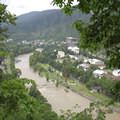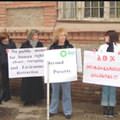|
在前蘇聯瓦解後獨立的喬治亞共和國,是西方人士所熟知史達林的出生地。這個被險峻的高加索山所圍繞的新興民主國家,另一個為世人稱道的則是他擁有豐富的高山森林、令人驚艷的山谷以及清淨澄澈的礦泉水源。

科契拉茲(照片提供:環保金人獎主辦單位)
32歲的科契拉茲全心投入保護家鄉的自然資源,以及在那生活的鄉親。成為科學家之後,科契拉茲離開校園,成立了Green
Alternative這個組織,它是喬治亞境內最有影響力的幾個非政府組織之一。科契拉茲與她的團隊,讓社會大眾開始關心由英國BP石油公司所主導的一項耗資30億美元、每日輸送100萬桶原油的輸油管線興建計畫──BTC計畫。BTC代表3座城市的第一個字母,此一連接裡海及地中海沿岸的輸油管線,將橫跨巴庫(亞塞拜然)、第比利斯(喬治亞)與澤依罕(土耳其)。在這場對抗石油公司的戰役中,科契拉茲走來並不孤單,國際環保組織及喬治亞學運也相繼聲援,並指出此一輸油管線將會耗用巨大的環境及社會成本。雖然喬治亞政府與國營媒體不斷對這群環保人士展開嚴厲的撻伐,但這些鬥士的努力已逼使輸油管線計畫負責人不得不做出幾項重大的讓步,其中包括補償那些土地遭到輸油管線破壞的地主。更重要的是,正如科契拉茲所說,這些對於BTC計畫的反對聲浪,旨在為這思想被長期壓抑的社會,打造一個可供異議份子發言的政治空間。
2004年4月19日在美國加州舊金山舉辦的頒獎典禮中,科契拉茲獲得了2004年第14屆「環保金人獎」,在接受舊金山Grist雜誌記者訪問時,她表示將會把部分獎金用來幫助她的組織,同時也會把部分款項捐出以協助當地失聰的學童。 |
The Republic of Georgia, which gained its independence after the breakup
of the Soviet Union, may be best known to Westerners as the birthplace
of Josef Stalin. But this new democracy, bordered by the formidable
Caucasus mountains, is also known for its alpine forests, stunning
mountain gorges, and clear-running mineral springs.

Kochladze.(Photo: Goldman Environmental Prize)
Manana Kochladze, 32, has dedicated herself to protecting the natural
resources -- and the people -- of her homeland. Trained as a scientist,
Kochladze left the academic world to found Green Alternative, now one of
the most powerful non-governmental organizations in Georgia. Kochladze
and her group have drawn public attention to the planned Baku-Tbilisi-Ceyhan
(BTC) pipeline, a $3 billion BP-led project that would carry a million
barrels of oil per day from the Caspian Sea to the Mediterranean coast.
Kochladze's campaign, backed by international environmental groups and
the Georgian student movement, has pointed out the huge environmental
and social costs of the pipeline. Despite harsh criticism from the
Georgian government and the state-influenced press, activists have
secured several major concessions from project leaders, including
compensation for people whose land would be damaged by the pipeline.
Just as importantly, says Kochladze, BTC critics have "managed to create
a political space" for dissent in an often repressive society.
Kochladze was awarded a 2004 Goldman Environmental Prize at a
ceremony in San Francisco, Calif., on April 19. She plans to use her
prize money to help her organization, but she will also donate part of
it to local schools for deaf children. She spoke to Grist from San
Francisco.
|
|
問:我知道您之前是被訓練成為一位科學家,但最後您卻決定成為一個行動主義者,是哪些事情改變了你的人生規劃? 答:沒什麼特別的。我是一個生物學家,所以我自然對環境議題有興趣,而且我一直都嘗試擔任環保組織的義工,例如地球之友喬治亞分會。直到有一天我想通了,與其等待數年或100年後才讓我的科學工作影響這個國家,不如我從今天開始就來嘗試改變他。
問:您成立Green Alternative的時間與宗旨為何?
答:在2000年成立Green
Alternative之前,我與我的戰友們為地球之友工作,後來有一天我們決定成立這個自己的組織。我們想要整合經濟、社會及環保等不同途徑,以打造一個能讓環境永續發展的經濟藍圖。
問:請您描述一下BTC輸油管線計畫,以及它對於喬治亞環境及人民的影響。
答:這是世界上最大的輸油管線計畫。每天運送一百萬桶原油,經過喬治亞境內248公里。不幸的是,當中有幾塊區域非常敏感,其中Gorjomi峽谷擁有一座世界知名的礦泉水源,其礦泉水產品佔國家貿易出口的10%。不論就環境或經濟的觀點來看,這都是一塊非常重要的區域。

Borjomi──令人驚嘆的峽谷(照片提供:科契拉茲)
這個計畫對政府來說是勢在必行,我們也體認到不可能阻止這個計畫的施行,所以我們採取比較務實的做法。我們嘗試確保這個由世界銀行擔任貸款銀行的計畫,可以為這個區域的人民帶來利益,而不只是讓企業獲利;同時,我們也希望它能進一步保障人權並符合高規格的環保標準。許多國際環保團體支援我們打這場大戰,讓我們將此地區性問題帶到世界銀行去。我們做了許多調查報告,並舉行記者會來使世人注意到這個問題。另一方面,我們也與那些受到該計畫直接衝擊的地方社區合作,教導她們應享有哪些權利,以及如何寫信才能得到正式的回應。我們也提供免費的法律服務,代表他們在法庭上與BTC或當地政府訴訟。
問:您們這次在與BTC的戰爭中獲得空前的勝利,您如何看待這樣的成果?
答:我們為那些受到此輸油計畫影響的民眾,打造了一個發言空間。面對一個在政治上如此重要的計畫,要住在這塊土地上的民眾說出他們對此的疑慮,可說是是難上加難。任何有異議的人,將被視為國家的敵人。我感覺我們已經營造了一個政治空間,讓這些人公開表達他們的意見。在喬治亞,媒體也越來越有興趣去探討有爭議的問題,以及以更深入的角度來看待人類的生活。
問:在這次戰鬥中,您所遭遇最大的障礙是什麼?
答:這些大公司與世界銀行都只關切這個輸油計畫在政治上的重要性,卻不在乎某些細節。我們的看法是,正因為它是一個政治上的重要計畫,所以我們更應該審慎面對所有的細節。不幸的是,我們看到這家公司不是以這種方法來處理,他們總是以該計畫在政治上的重要性做為藉口,忽略這些問題。

抗議輸油管線的民眾(照片提供:環保金人獎主辦單位)
問:你曾經遇到過經濟發展與環保相衝突的時候嗎?也就是為了環保會減少喬治亞人的工作機會。
答:在我的一生中未曾遇到過。大部分的時候,是那些不明智的開發計畫使得兩者皆受傷害,不僅是環保受到破壞,連帶經濟也失去保障。以BTC計畫為例,礦泉水公司的員工可能因此而丟掉飯碗。通常當我評估一個計畫確實對環境產生影響時,我同時也發現就長期的觀點來說,它對經濟發展也是不明智的。
問:在你成為行動主義者這麼多年來,你的策略有何改變?
答:我必須承認早年我的眼光狹隘(笑)。我當時只有一個想法,那就是保護區域應該越多越好,而且應該採取嚴厲的保護法規,我們沒有站在社會面或經濟面來看。現在我們開始了解到問題的中心,我們必須兼顧各方面,如此才能使公眾獲利,也才可以使得環保更有效率。所以我真正成長了。
問:工業國家(如美國)中的環保運動人士該如何幫助您實現您的理想?
答:BP石油公司擁有綠色標章,那代表他們是一家綠色環保公司,但那僅表示她們在英國或美國也許是一家綠色環保公司;但在如喬治亞這樣的國家時卻並非如此,她們應該受到更多公眾的監督及討論。在我們與這家公司談判的時候,公眾的意見是我們最強而有力的工具。
問:這個獎對你有何意義?
答:我想他是對我們所做的事情的一種肯定,而且肯定我們是往正確的方向前進。我不覺得這個獎項是屬於我個人的,它是屬於這些年在BTC輸油管線計畫中與我們一起工作過的夥伴。這個來自國際的肯定將會幫助我們,讓我們在國內能對於BTC輸油管線的議題,激盪出更多的公眾討論。我希望這對大家來說是一件好事。
問:未來20年你希望喬治亞會變成如何?
答:我由衷地希望喬治亞不僅在思想上獨立,在經濟上也能獨立。未來20年,我希望喬治亞能在世界舞台上佔有一席之地,能夠更富有而不再貧窮。我希望我們能與跨國公司平等往來,不再讓它們覺得喬治亞人只是什麼都不懂的土包子。
|
Grist: I understand you were training for a scientific career when
you decided to become an activist. What made you change your course?
Kochladze:
There was nothing specific. I am a biologist, so I am interested
in environmental issues, and I always tried to volunteer with
environmental groups, like Friends of the Earth-Georgia, and one day I
decided that it was better just to really try to have an impact on the
country today -- rather than waiting a few years, or 100 years, for my
scientific work to have an impact.
Grist: When and why did you found the environmental group Green
Alternative?
Kochladze: The Green Alternative was
founded in the year 2000. Before that, I was working with other
colleagues at Friends of the Earth, and one day we decided to create our
own group. We wanted to integrate the economic, social, and
environmental approaches -- to create an economic framework that would
protect the environment and be more sustainable.
Grist: Please describe the BTC pipeline project and how it would
affect Georgia's environment and people.
Kochladze: It's the biggest pipeline in
the world. It would carry 1 million barrels of oil per day, and pass 248
kilometers [154 miles] through Georgia. Unfortunately, it would pass
through several sensitive areas in Georgia. The Borjomi Gorge has a
world-famous mineral spring, and its waters now constitute up to 10
percent of the country's exports. It's a very important area, not only
from an environmental perspective but also an economic one.
This project is so high, so big, that we know we cannot stop it. So
we are taking a more realistic approach. We are trying to ensure that
this project, which is financed by the World Bank, will bring benefits
to people in the region -- not just to the corporations -- and that it
will protect human rights and comply with the highest environmental
standards. We have a big campaign, with support by a number of
international groups, that is trying to bring local problems to the
World Bank. We have issued a number of reports and had a number of press
conferences to draw attention to the problems. Another thing we are
doing is working with local communities that are directly affected. We
are teaching them what their rights are, teaching them to write letters
in a way that will get answered. We are also providing free legal
support to some, representing them in the courts when they have some
problem with BTC or the local government.
Grist: What do you consider your greatest victory in the BTC
battle?
Kochladze: We have managed to create a
political space for people who are affected by this project. It's quite
hard for them to speak about their concerns -- the attitude was in the
land that people should not speak about the problems because the project
was so politically important. Local people who spoke about the problems
were considered enemies of the state. I feel we have created a political
space where people can openly express their opinions. The media in
Georgia has become more and more interested in picking up on
controversial issues, and they are looking at the human stories more
deeply.
Grist: What are the biggest obstacles you've encountered in this
fight?
Kochladze: The huge corporations, the
World Bank, all of them are coming from the point of view that the
project is so politically important that no one needs to take care of
the specific details. Our understanding is that the project is
politically important so it should be scrutinized. Unfortunately, we are
seeing that it's not this way -- the company uses political importance
as an excuse to ignore the problems.
Grist: Do you ever encounter conflicts between environmental
protection and economic development -- when environmental protections
would take jobs away from Georgians?
Kochladze: I never see this conflict in
my life. Most often it's that some kind of unwise development harms both
-- harms environmental protection as well as economic security. In the
case of the BTC project, the employees of the mineral-water industry
could lose their jobs. Usually, when I am estimating the environmental
impacts [of a project], I find out that from the long-term perspective
it is also economically unwise.
Grist: How have your strategies changed during your years as an
activist?
Kochladze: I should confess that at the
beginning I was quite narrow-minded [laughs]. The whole idea was that
protected areas should be increased, and that what's there should be
strictly protected. We never looked at the social side or the economic
side. Now we're starting to understand that the central point is to
really integrate those things -- that it's more beneficial for the
public and more effective environmental protection. So I have really
grown up.
Grist: How can environmental activists in industrialized countries
like the U.S. help your cause?
Kochladze: BP has a green logo -- they
present themselves as a green company -- and they might be a green
company in the U.K. or the U.S., but in countries like Georgia they are
not really green. There should be much more public scrutiny of BP, much
more discussion. Public opinion is one of the strongest tools we have in
our negotiations with the company.
Grist: What does this prize mean to you?
Kochladze: I think it's a recognition of
things we have done, but also a recognition that we are doing them in
the right way. I don't feel that it's just my prize -- it's also the
prize of the people we've worked with on the BTC pipeline for long
years. The recognition will help us to promote more public discussion
within the country on the BTC pipeline. I hope it will help people.
Grist: What do you hope Georgia will be like in 20 years?
Kochladze: I really want Georgia to be
independent from the economic point of view as well as from the mental.
I wish that Georgia will find its place in the world, that in 20 years
it will manage to become a more wealthy country with no more poverty. I
hope we will be equal partners with [multinational] corporations -- that
they will no longer look on Georgians like we're people who just don't
know anything.
|
